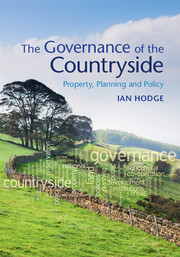Book contents
- Frontmatter
- Contents
- Preface
- Acknowledgements
- List of abbreviations
- Part I Introduction
- Part II Historical models
- Part III Governance under sectoral policies
- Part IV Alternative approaches to governance
- 13 Reconstituting markets
- 14 Coordination, cooperation and collective action
- 15 Public land ownership
- Part V Conclusions
- References
- Index
13 - Reconstituting markets
from Part IV - Alternative approaches to governance
Published online by Cambridge University Press: 05 February 2016
- Frontmatter
- Contents
- Preface
- Acknowledgements
- List of abbreviations
- Part I Introduction
- Part II Historical models
- Part III Governance under sectoral policies
- Part IV Alternative approaches to governance
- 13 Reconstituting markets
- 14 Coordination, cooperation and collective action
- 15 Public land ownership
- Part V Conclusions
- References
- Index
Summary
The nature and scope of the economy (arena of markets) are, after all, social constructs. The market economy is not an end in itself but is, instead, merely instrumental to other ends.
D.W. Bromley (2006) Sufficient Reason. Volitional Pragmatism and the Meaning of Economic Institutions. Princeton University Press, Princeton NJ (p. 202)13.1 Introduction
While many assume that it is the market that represents the primary cause of environmental problems, others argue that ‘free markets’ offer the solution. Anderson and Leal (1989), advocates of Free Market Environmentalism, propose that a system of well-specified property rights offers the mechanism for environmental conservation. There is some merit in this. However, we should not claim that markets are either ‘good’ or ‘bad’. While private resource owners who have a secure long-term interest in the value of their asset and a concern to see its value protected for their successors will have a strong incentive towards stewardship, markets in which important external costs remain unpriced can be a cause of considerable environmental damage. The whole edifice of agri-environment regulation and payments is erected largely on the argument that markets fail and yet environmental damage can also be caused by inappropriate government policies. Rather, we would follow the view taken by Daniel Bromley. He comments ‘There is no such thing as the “Market”. Rather, there are infinitely many ways of constructing domains of exchange – each one reflecting prior collective notions and expressions of who counts, and what is valuable or useful’ (Bromley, 1997, p. 1391). Or as emphasised by Schmid (2004, p. 169), ‘Rights are antecedent to the market, not an interference with some state of nature.’ Thus, we recognise that markets are created by society and can be directed towards various ends. So markets both reflect and influence governance and of course they have important implications for the way in which the costs and benefits of the countryside are developed and shared.
There has been a strong movement worldwide in recent decades to shift control of resource allocation away from government towards the increased use of markets (see e.g. Harvey, 2005). This has included the privatisation of publicly owned enterprises as well as the greater use of market mechanisms more generally, through deregulation, tendering and contracting out – the process of neoliberalisation.
- Type
- Chapter
- Information
- The Governance of the CountrysideProperty, Planning and Policy, pp. 267 - 295Publisher: Cambridge University PressPrint publication year: 2016



